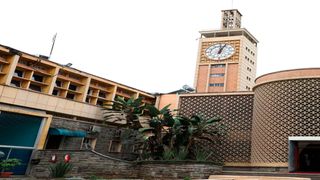
A section of Parliament Buildings, Nairobi.
| File | Nation Media GroupOur Columnists
Premium
Blame politicians’ greed for hardship
The war in Ukraine has become the go-to phrase for politicians who want to hide their incompetence and greed across the four corners of the world.
But in Kenya it has taken a life of its own. It has not only become the reason to make Kenyans live without electricity, struggle to use their cars but also to starve them.
The Sh17 billion fuel import saga is just a tip of the problem. ‘Greedflation’ has gained traction in the country in a manner never seen before. The global economic turmoil, if ever there was one, has created the perfect storm for consumers.
Corruption, which is the preserve of the political class, has made it easer for them to take consumers for a ride by creating artificial hardship situations to justify importation of foods even if the country is saturated with grains and cooking oil for financial gain.
The faces of the lay people behind the scam are just that. Just a front for politicians who abuse their powers to destabilise the markets so as to create a conducive environment for their scams.
Kenyan politicians have voiced the shortages of many essential commodities, controlled their prices and sang the ‘Ukraine war’ song in unison, not to inform of legitimate jitters in the economy but pre-empt their various scams in controlling the economy.
Kenya’s economic experts, who are paid huge salaries, hardly speak up unless they are out to back a scam orchestrated by the political class. Organisations with the legal responsibility to protect Kenyans from exploitation and price-fixing are hardly ever heard; maybe they are part of the scam.
Essentially, there would be no dumping of substandard goods or importation of maize, sugar and oil to the detriment of local farmers and industries if oversight authorities did their work or had the spine to stand up to political influence on control of essential commodities.
Decrying global economic challenges only for politicians to control and import essential goods through proxies speaks of greedflation than actual inflation.
Kenya’s food basket produces enough maize and sugar that should be sufficient to feed the nation and other cash crops for export to raise more revenue for the country.
Even supermarkets abroad rely on Kenya’s horticultural industry for their vegetables, flowers, coffees and teas.
Not all parts of the country are affected by drought and, therefore, if well-managed, the food basket of central Kenya and Rift Valley regions and sabotaged irrigation schemes should be able to feed the nation.
Greed and its relative corruption
The problem, therefore, is not that we do not have a conducive environment to take care of the nation but its greed and its relative corruption that is causing Kenyans to suffer. Rather than buy maize and sugar at market rates and benefit local farmers, the political class will control the prices, allow importation of similar products cheaply and kill the local industries along the way.
The number of Kenyans who live below the poverty line has decreased marginally, according to the last World Bank report. However, extreme poverty is still present as many Kenyans struggle to access basic items such as food, housing and healthcare.
The main contributory factors to poverty in the country are social inequality and corruption, both of human and political creation. Even the recent housing project targeting the urban poor in the slums is mired in controversy and suspicions. Similar attempts previously benefited the policymakers mostly and not the poor.
Kenya’s politics has become all about business and quest for personal wealth. It is no longer about serving the country or the voters but primitive accumulation of wealth. Election is one big con that voters keep falling for. Essentially, we vote to be scammed. As voters’ lives stand still, the fortunes of the political class keep soaring.
A politician will even show up in a private helicopter to open a straw-built bridge that hardly lasts the next rainy season. They squander the money for the village roads to buy themselves helicopters. For, how else would they afford such wealth in a short space of time if not for embezzlement and greedflation?
Kenyans have shared online what they expect to pay for essential commodities (in Kenya shillings)—unga (maize flour) 2kg: 60; sugar 1kg: 90/-, cooking oil 1L: 150; milk 0.5L: 40; bread 400g: 40; cooking gas 6kg cylinder: 800—because the prices of essential food items have tripled or even quadrupled in recent times.
It could almost be tolerable if the global high cost of living was anything to go by. However, if there are shady deals and shadowy faces controlling the prices of essential products and even dumping cheap substandard food items for profit, then it is justifiable to say that the high prices of food are a creation of the political class, who partake in the exercise and/or are complicit in manipulation of prices and importation of foods, oils and gas.
As a corrupt country, Kenya is a model for 'greedflation' and it’s a beast that needs taming now.
- Ms Guyo is a legal researcher. [email protected]. @kdiguyo





